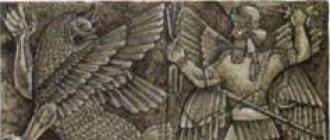PASSIVE VOICE . Страдательный залог.
Тренировочные упражнения для 8 класса.
Правило.
Пассивный (или страдательный) залог в английском языке употребляется в тех случаях, когда факт совершения действия гораздо важнее, чем его исполнитель.
The towels were not used yesterday. – Полотенцами вчера не пользовались = Полотенца не были использованы вчера.
В данном предложении подлежащее обозначает предмет (полотенца), который подвержен действию со стороны какого-то лица (исполнитель нам конкретно неизвестен), а сам при этом ничего не выполняет. Тот факт, что полотенцами не пользовались, куда важнее для говорящего, чем то, кто именно ими не воспользовался.
Помните, если действие осуществляется при помощи какого-либо предмета, инструмента, материала, то используется предлог with .
The streets are covered with snow. – Улицы покрыты снегом .
Если исполнитель действия – человек или группа людей, мы поставим предлог by .
He was asked about the accident by the police yesterday. – Вчера полиция спрашивала у него о несчастном случае .
Когда употребляется страдательный залог?
Существует мнение, что следует избегать употребления страдательного залога особенно в письменной речи, чтобы не усложнять высказывание. Это действительно так: не нужно употреблять страдательный залог там, где можно употребить действительный. Когда стоит употреблять пассивный залог? Есть несколько случаев:
Лицо / предмет, совершающее действие, неизвестно.
Our house was broken into last week. – Наш дом ограбили на прошлой неделе .
Лицо / предмет, совершающее действие, не важен.
The job will be finished by Monday. – Работа будет закончена к понедельнику .
Лицо / предмет, совершающее действие, очевиден из контекста.
My brother was fined for driving without license. – Моего брата оштрафовали за вождение без прав .
когда мы заинтересованы в действии, а не в деятеле (в новостях, инструкциях, заголовках, объявлениях).
The international exhibition of sport equipment will be held next month. – Международная выставка спортивного оборудования будет проведена в следующем месяце.
Для описания процесса приготовления, инструкция проведения исследований и пр.
Water is heated and added to the mixture. – Вода нагревается и добавляется к смеси .
В официальных объявлениях, в научных докладах.
Much research has been conducted on this topic. – Множество исследований было проведено по этой теме.
| Образование | Когда используем | ||||
| Present Continuous | am/is/are being + III форма глагола (или правильный глагол с окончанием -ed) | действие происходит в момент речи | Their plan is being considered by the members of the committee. Их план рассматривается членами комитета. |
||
| was/were being + III форма глагола (или правильный глагол с окончанием -ed) | действие было в процессе в определенный момент в прошлом | While we were having lunch, the room was being cleaned . Пока мы обедали, комнату убирали. |
|||
| Future Continuous | |||||
| had been + III форма глагола (или правильный глагол с окончанием -ed) | прошедшее действие, предшествующее другому прошедшему | When her parents arrived, the problem had already been solved . Когда приехали ее родители, проблему уже решили. |
|||
| will have been + III форма глагола (или правильный глагол с окончанием -ed) | действие, которое будет завершено до определенного момента в будущем | This document will have been sent by 6 o’clock. Этот документ будет отправлен к шести часам. |
|||
| Present/Past/Future Perfect Continuous | Данной формы в пассивном залоге не существует |
||||
Task1. Translate into Russian.
Breakfast was cooked by our mother.
The new rule was explained to us at the English lesson.
The story was written by Chekhov.
This sports centre was visited by lots of people.
This sports game is often played at P.E. lessons.
The ball was thrown over the fence.
The boxer was knocked down.
I was born in Moscow.
They will be trained by a famous coach.
I will be sent to the competition.
Task 2. Choose the right answer and translate into Russian.
The news programme (is watched / watched) by millions of people every day.
The Mona Liza (painted / was painted) by Leonardo da Vinchi.
The new cinema (be built / will be built) next year.
New pop groups (are much spoken / is much spoken ) about among teenagers.
Alexander Pushkin’s first poem (was written / written) when he was fourteen.
The letters (be sent / will be sent ) by post tomorrow.
The translation (was finished / were finished ) two hours ago.
London (visited / is visited) by hundreds of tourists every year.
The dinner (be / will be) ready in an hour (через час).
The book (wrote/was written ) by Hardy.
The house (bought/was bought ) by pop star.
Local police (have been arrested/have arrested ) the bank robber.
I (arrived/was arrived ) last Friday.
The room (will clean/will be cleaned ) later.
Tom (has lost/has been lost ) his key.
Task 3. Open the brackets using the verbs in Present, Past или Future Simple Passive.
Tom always (to ask) at the lessons.
I (to ask) at the last lesson.
Our country house (to finish) next year.
The dog (to find) by my sister yesterday.
This work (to do) tomorrow.
This text (to translate) at the last lesson.
These trees (to plant) every autumn.
Many interesting games always (to play) at our P.E. lessons.
This bone (to give) to my dog tomorrow.
We (to invite) to a concert last Saturday.
Task 4. Put the verbs in brackets into the correct passive form.
I can’t give you these articles. They (translate) now.
The letter (not write) tomorrow.
English (speak) all over the world.
She showed me the picture that (paint) by her husband.
My dress is clean now. It (wash).
All the questions on the paper must (answer).
These houses (build) in 1500.
Rugby (play) since 1845.
My house (paint) the whole day yesterday.
This film (discuss) at the next lesson.
It was very dark. Nothing could (see).
Wait a little! Your question (receive) by next Sunday.
The UK (wash) by the Atlantic Ocean and the North Sea.
Task 5. Translate the sentences into English.
За этим доктором часто посылают.
С ним уже поговорили.
Когда он приехал, письмо уже было получено.
Перевод должен быть закончен вовремя.
Наш дом сейчас ремонтируют.
Когда я пришла домой, обед был уже сварен.
Этот вопрос можно обсудить завтра.
В хоккей обычно играют зимой.
Это стихотворение надо выучить наизусть.
Письмо было написано вчера.
Я думала, что хлеб и масло уже купили.
Эту работу можно сделать завтра.
когда я вернулся домой, как раз готовили обед.
Эту статью сейчас переводят.
Эту книгу вернут вовремя?
Вам в школе дают книги для чтения?
Нас встретят на станции?
Привет, друзья! Для многих тема активного и пассивного залога в английском является сложной и непонятной. Кто-то сталкивается с проблемами при образовании пассивной формы, кто-то не умеет переводить такие предложения. Если вы будете знать, как образовать PassiveVoice , научитесь распознавать и понимать такие предложения, эти навыки сделают вашу речь разнообразнее и богаче, а ваши языковые компетенции станут еще на шаг ближе к владению языком на уровне носителя английского.
Что такое пассивный залог?
В английском языке залог указывает на то, выполняет ли подлежащее действие самостоятельно активный / действительный залог, или действие совершается над ним пассивный / страдательный залог.
Таким образом, есть два залога:
- Active Voice — Активный
- Passive Voice — Пассивный
Пассивный залог в английском языке таблица

Активный залог в английском языке таблица

- Active Voice: They usually visit their granny. — Они обычно навещают свою бабулю.
- Passive Voice: Their granny is usually visited. — Их бабулю часто навещают.
- Active Voice: They are visiting their granny now. — Сейчас они навещают свою бабулю.
- Passive Voice: Their granny is being visited now. — Их бабулю сейчас навещают.
- Active Voice: They have just visited their granny — Они только что навестили свою бабулю.
- Passive Voice: Their granny has just been visited . — Их бабулю только что навестили.
Запоминаем, 3 случая использования пассивного залога в английском языке
- Когда мы не знаем, кто совершил действие. Например: Банк ограбили (мы не знаем, кто это сделал).
- Когда нам не важно, кто совершил действие, а важно само это действие. Например: Этот дом построят в следующем году (нам не важно, кто это сделает, нам важно, что он будет построен).
- Когда мы не хотим говорить, кто именно это сделал (если произошло что-то плохое, и мы не хотим никого обвинять). Например: Праздник испорчен (мы не хотим говорить, кто его испортил).
Таблица с временными формами страдательного залога
| Время | Образование | Когда используем | Пример |
|---|---|---|---|
| Present Continuous | am /is /are being ed ) | действие происходит в момент речи | Their plan is being considered
by the members of the committee
.
Их план рассматривается членами комитета. |
| Past Continuous | was /were being + III форма глагола (или правильный глагол с окончанием -ed ) | действие было в процессе в определенный момент в прошлом | While we were having lunch
, the room was being cleaned
.
Пока мы обедали, комнату убирали. |
| Future Continuous | |||
| Past Perfect | had been + III форма глагола (или правильный глагол с окончанием -ed ) | прошедшее действие, предшествующее другому прошедшему | When her parents arrived
, the problem had
already been solved
.
Когда приехали ее родители, проблему уже решили. |
| Future Perfect | will have been + III форма глагола (или правильный глагол с окончанием -ed ) | действие, которое будет завершено до определенного момента в будущем | This document will have been sent
by 6 o’clock
.
Этот документ будет отправлен к шести часам. |
| Present /Past /Future Perfect Continuous | Данной формы в пассивном залоге не существует | ||
Упражнения с ответами
Упражнение 1. Раскройте скобки, употребляя глаголы в Present Simple Passive.
- The postbox (to empty) every day.
- The stamps (to postmark) at the post office.
- The letters (to sort) into the different towns.
- The mail (to load) into the train.
- The mailbags (to unload) after their journey.
- The bags (to take) to the post office.
- The letters (to sort) into the different streets.
- The letters (to deliver).
Упражнение 2. Раскройте скобки, выбирая требующуюся форму глагола.
- At the station they will (meet, be met) by a man from the travel bureau.
- She will (meet, be met) them in the hall upstairs.
- The porter will (bring, be brought) your luggage to your room.
- Your luggage will (bring, be brought) up in the lift.
- You may (leave, be left) your hat and coat in the cloakroom downstairs.
- They can (leave, be left) the key with the clerk downstairs.
- From the station they will (take, be taken) straight to the hotel.
- Tomorrow he will (take, be taken) them to the Russian Museum.
Упражнение 3. Раскройте скобки, употребляя глаголы в Active Voice или Passive Voice.
- Nobody (to see) him yesterday.
- The telegram (to receive) tomorrow.
- He (to give) me this book next week.
- The answer to this question can (to find) in the encyclopedia.
- We (to show) the historical monuments of the capital to the delegation tomorrow.
- You can (to find) interesting information about the life in the USA in this book.
- Budapest (to divide) by the Danube into two parts: Buda and Pest.
- Yuri Dolgoruki (to found) Moscow in 1147.
- Moscow University (to found) by Lomonosov.
- We (to call) Zhukovski the father of Russian aviation.
Passive Voice
Simple group
1. Put the verbs in brackets into the Present Simple Passive.
1. Thousands of calls ____________ (make) from mobile phones every day. 2. Stars __________ (see) in the sky at night. 3. Coffee ___________ (grow) in South America. 4. The news ___________ (report) every day. 5. Animals in the zoo ___________ (feed) 3 times a day. 6. Milk __________ (produce) by cows. 7. Computers __________ (use) in different spheres of modern life. 8. The Tower of London ____________ (visit) by thousands of tourists every year. 9. This town ____________ (situate) in the north of the country. 10. Famous pieces of art __________ (keep) in museums.
2. Put the verbs in brackets into the Past Simple Passive.
The Statue of Liberty
The Statue of Liberty _________ (create) by a French architect Bartholdi. It ____________ (make) in France. The statue _____________ (build) 11 years and when it was ready, it ___________ (take) to the USA by ship. A huge base for the statue ____________ (prepare) by Americans on one of the islands 2 miles from Manhattan. A lift and 390 steps ____________ (make) so that the visitors could reach the crown top of “Lady Liberty” and admire the view of the area. The Statue of Liberty ____________ (recognize) as a symbol of American freedom. Ninety years later the statue _______________ (restore) by a team of French and American experts.
3. Put the verbs in brackets into the Future Simple Passive.
1. This experiment ____________ (finish) in a week. 2. The play ____________ (perform) next Sunday. 3. The instructions _______________ (receive) in an hour. 4. The design of the building ______________ (not/complete) next month. 5. The injured man ____________ (operate) on in an hour. 6. All the meetings ____________ (arrange) next week. 7. The document ______________ (sign) in some minutes. 8. This bill ___________ (not/pay) tomorrow. 9. This question ____________ (not/discuss) at the next conference. 10. The car ____________ (not/repair) in 2 days.
4. Put the verbs in brackets into the Present Simple Passive, the Past Simple Passive or the Future Simple Passive.
1. The room ______________ (clean) yesterday. 2. New houses ____________ (build) in our city every year. 3. The book of this writer ______________ (publish) in a month. 4. The trees ____________ (whitewash) by our pupils every spring. 5. Tea _____________ (grow) in Ceylon and India. 6. America _____________ (not/discover) by James Cook. It _____________ (discover) by Christopher Columbus. 7. Pizza ___________ (deliver) in half an hour. 8. Thousands of new cars _______________ (produce) at this plant every year. 9. Ink ___________ (use) for writing many years ago. 10. Some new technologies _____________ (introduce) to the industrial companies at the end of the following month.
5. Translate into English
1. Билеты на самолет принесут через час.
2. Эту машину покрасили 3 часа назад.
3. Компьютерами пользуются все ученики нашей школы.
4. Где продают свежее молоко?
5. Когда изобрели паровой двигатель?
6. Это объявление не напечатают.
7. Бумагу делают из дерева.
8. Эту церковь построили в прошлом столетии.
9. Кем был основан этот музей?
6. Fill in by or with
1. The note was written ____ a pencil. 2. Dinner will be cooked _____ my aunt. 3. This story was told _____ famous traveler. 4. Meat is eaten _____ a fork and knife. 5. The report will be prepared _____ our manager. 6. The carpets are cleaned _____ a vacuum cleaner. 7. The rooms in the hotel are cleaned _____ maids. 8. The article was written _____ a young journalist. 9. The politicians were interviewed ____ reporters. 10. This star was discovered _____ our scientists.
7. Make up the sentences using the Passive Voice of modal verbs.
1. The homework /must / do.
2. The ball /can/ use/ in the gym.
3. The dishes /must/ wash.
4. The essay/ should/write.
5. The dog/should/ feed.
6. This question/could/discuss/yesterday.
7. The things/must/pack.
8. The documents/ couldn’t/sign/yesterday.
9. Mobile phones/can’t/use/during the lesson.
10. Loud music/shouldn’t/play/here.
Раскройте скобки , употребляя глаголы в Present, Past или Future Simple Passive.
1. Bread (to eat) every day. 2. The letter (to receive) yesterday. 3. Nick (to send) to Moscow next week. 4. I (to ask) at the lesson yesterday. 5. I (to give) a very interesting book at the library last Friday. 6. Many houses (to build) in our town every year. 7. This work (to do) tomorrow. 8. This text (to translate) at the last lesson. 9. These trees (to plant) last autumn. 10. Many interesting games always (to play) at our PT lessons. 11. This bone (to give) to my dog tomorrow. 12. We (to invite) to a concert last Saturday. 13. My question (to answer) yesterday. 14. Hockey (to play) in winter. 15. Mushrooms (to gather) in autumn. 16. Many houses (to burn) during the Great Fire of London. 17. His new book (to finish) next year. 18. Flowers (to sell) in shops and in the streets. 19. St. Petersburg (to found) in 1703.
Passive Voice, обращая внимание на место предлога.
E.g. We often speak about her. - She is often spoken about.
1. We thought about our friend all the time. 2. The doctor will operate on him in a week. 3. The teacher sent for the pupil"s parents. 4. They looked for the newspaper everywhere. 5. Nobody slept in the bed. 6. The neighbour asked for the telegram. 7. Everybody listened to the lecturer with great attention. 8. The senior students laughed at the freshman. 9. The group spoke to the headmistress yesterday. 10. The young mothers looked after their babies with great care. 11. Nobody lived in that old house. 12. They sent for Jim and told him to prepare a report on that subject.
Передайте следующие предложения в Passive Voice.
E.g. Mother waters the flowers in the evening.
The flowers are watered in the evening (by Mother)
1. A marble pavillion protects the house. 2. The boys will paint the roof of the house. 3. Tom Sawyer whitewashed the fence. 4. Her daughters gave her three beautiful dishes as a birthday present. 5. Tom gave Nick a book for his birthday. 6. Our mother tells us stories every evening. 7. Lydia will show you a new book of pictures. 8. A boy showed her the way. 9. They will send us a box of fruit. 10. Five or six small children followed them. 11. In summer the boys often drive the horses to the fields. 12. Ivan Susanin led the Poles into the thickest part of the forest. 13. The waves carried the boat away. 14. We shall do the translation in the evening. 15. They water the flowers regularly. 16. You promised me these books long ago, 17. Bessie"s father gave her a complete set of Walter Scott"s works. 18. Irene"s husband brought her some beautiful shells from the south. 19. The explorers gave the newspaper reporters a long interview. 20. Mr. Wilson will teach you English. 21. The doctor ordered me a month"s rest from studying.
Раскройте скобки , употребляя глаголы в Active или Passive Voice.
1. Nobody (to see) him yesterday. 2. The telegram (to receive) tomorrow. 3. He (to give) me this book next week. 4. The answer to this question can (to find) in the encyclopedia. 5. We (to show) the historical monuments of the capital to the delegation. 6. You can (to find) interesting information about the life in the USA in this book. 7. Budapest (to divide) by the Danube into two parts: Buda and Pest. 8. Yuri Dolgoruki (to found) Moscow in 1147. 9. Moscow University (to found) by Lomonosov. 10. We (to call) Zhukovski the father of Russian aviation.
V1 Передайте следующие предложения в Passive Voice.
1. At twelve o"clock the workers were loading the trucks. 2. By three o"clock the workers had loaded the trucks. 3. We send our daughter to rest in the south every year. 4. They will show this film on TV. 5. They are building a new concert-hall in our street. 6. They have made a number of important experiments in this laboratory. 7. Livingstone explored Central Africa in the 19th century.8. By the middle of autumn we had planted all the trees. 9. They will stage this play at the beginning of next season. 10. They have forgotten the story. 11. Has anybody explained the rules of the game to you? 12. They haven"t brought back my skates.
V 2 Передайте следующие предложения в Passive Voice .
1. I bought potatoes yesterday. 2. We shall bring the books tomorrow. 3. They are repairing the clock now. 4. They sell milk in this shop. 5. I have translated the whole text. 6. They broke the window last week. 7. When I came home, they had eaten the sweets. 8. We shall do the work in the evening. 9. He wrote this book in the 19th century. 10. They were playing tennis from four till five. 11. He stole a lot of money from the shop. 12. By six o"clock they had finished the work.
V3 Передайте следующие предложения в Passive Voice.
1. The students greeted the famous lecturer warmly. 2. They have recently built a huge plant, in the town of N. 3. We must finish the work by tomorrow. 4. When I fell ill, my mother sent for the doctor. 5. They looked for the girl everywhere. 6. They did not listen to the boy. 7. She looks after the patients well. 8. They asked for our address. 9. My father looked through these papers this morning. 10. He will give my brother English lessons. 11. A friend of his has shown me an interesting magazine. 12. His friend told him everything.
V 4 Передайте следующие предложения в Passive Voice .
1. They showed Helen the nearest way to the theatre. 2. He gave his patient some good advice. 3. Mary has told me the news. 4. The people looked at the little boy with interest.5. They examined the paper attentively. 6. We asked him about his holidays. 7. They have already discussed the novel. 8. He did not give me his address. 9. She showed him the way to the metro station. 10. He will introduce me to his friends. 11. They are building a bridge over the river. 12. I haven"t yet translated the article.
V5 Передайте следующие предложения в Passive Voice.
1. We turn on the light when it is dark. 2. The students finished their translation in time. 3. Helen washed the dishes. 4. Betty often took her younger brother for a walk. 5. Mother has made some coffee. 6. Have you ironed your dress yet? 7. Nina mispronounced this word. 8. They have told her the truth. 9. She promised us an interesting entertainment. 10. One uses chalk for writing on the blackboard. 11. I shall finish my work about seven o"clock. 12. Somebody has opened the door.
V6 Передайте следующие предложения в Passive Voice.
1. They did not invite her to the party. 2. I did not leave the window open. 3. They did not turn off the light. 4. I have invited some friends to tea 5. She has given me an English book. 6. Have you written the letter yet? 7. They have told us a lot о S interesting things. 8. The students have written the test-paper without mistakes. 9. The children have scattered about a lot of things. 10. The girl has put all the books into the bookcase. 11. Snow, will cover the fields in winter. 12. They will hand in the homework tomorrow.
TEST
PASSIVE
FORM7
Choose the correct form.
1.America … by Columbus in 1498.
a). is discovered b). was discovered b). discovered
2.The houses … of stone and wood.
a) were built b)are built c). are being built
3.The article … already … .
a). had … been typed b). will be typed c). has … been typed
4.These letters … tomorrow.
a)are mailed b).were mailed c). will be mailed
5.The fish … very well.
a). was cooked b). had been cooked c). will be cooked
6.Moscow University … in 1755.
a). is founded b). was founded c).will be founded
7.Three foreign languages … in our school next year.
a). is taught b). was taught c). will be taught
8.The doctor … an hour ago.
a). send for b). is sent for c).was sent for
9.English … in many countries of the world.
a). is being spoken b). spoke c). is spoken
10.Most of the Earth’s surface(поверхность Земли ) … by water.
a). is covered b) coveres c) was covered
Запомнив когда и какой вспомогательный глагол используется, можно переходить к построению предложений. Очень эффективными считаются упражнения на Passive Voice, которые необходимо перестроить из активного залога. Их часто называют переделки.
Мы прекрасно знаем, что в страдательном залоге используются предлоги by, with, первый из которых показывает, что действие совершает одушевленное подлежащее, а второй - неодушевленное. Чтобы эта информация четко отложилась в памяти, проделайте хотя бы одно упражнение на эту тематику.
Когда вы отработаете все формы, все времена, пройдите комплексный тест Passive Voice , чтобы быть уверенным, что вы все правильно поняли.
Но и здесь есть несколько подводных камней. Например, пассивные конструкции, некоторые глаголы со страдательным значением. Если первые можно выучить наизусть, запомнить со временем, то последние очень часто вызывают затруднение. Необходимо анализировать предложение. Обязательно пройдите несколько упражнений (exercises) по данному вопросу.
Когда все эти этапы будут позади, вы будете уверены, что страдательный залог не просто пройден, а отложен в памяти надолго. Но не забывайте периодически повторять материал. Все со временем забывается, а язык и все его правила особенно. Научитесь жить с английским, проводить с ним время, и тогда у вас все получится.
1. Перепишите предложения из активного залога в пассивный
Nobody has used this room for ages.
We will give you the keys tomorrow.
Someone is interviewing Dr Johnson at the moment.
By the time I arrived, someone had already opened all your letters.
We usually talk briefly about the problems of the family at dinner time.
Ответы:
This room hasn’t been used for ages.
The keys will be given you tomorrow.
Dr Johnson is being interviewed at the moment.
By the time I arrived, all your letters had been already opened.
The problems of the family are usually talked briefly at dinner time.
2 . Выберите правильный вариант
1. This theatre … (build) over 100 years ago.
a. had been built
b. has been built
c. was built
2. Is your car still for sale? - No. It … already (sell).
a. has been sold
b. had been sold
c. was sold
3. Sometimes mistakes … (make).
a. are made
b. are being made.
c. have been made
4. For the past few days I (work) in Jack’s office, as my own … (decorate).
a. have been working/ is being decorated
b. worked/ decorated
c. am worked/ is being decorated.
5. While my friend … (talk) to me, his wallet .. (steal).
a. was being talked/ was being stolen
b. was talking/ was stolen
c. talked/stole
6. Where is your friend Bob? - - I don’t know. He … (not/ seen) resently.
a. hasn’t seen
b. didn’t see
c. hasn’t been seen
7. If someone … (report) you to the police, you … (make) to pay a big fine.
a. reports/ will be made
b. will report/ will make
c. is reported/ will be made
8. Professor … (give) another lecture at the same time next week.
a. will have been given
b. will be given
c. will give
9. Look at the dust in here! It … (look) as if this room (not/clean) … for a month.
a. is looked/ hasn’t cleaned
b. looks/ hasn’t been cleaned
c. has looked/ isn’t cleaned
10. The door … (open) and a young lady … (come in). It should be admitted that the door … (open) by herself.
a. opened/ came in/ was opened
b. was opened/ came in/ was opened
c. opened/ came in/ opened
Ответы :
3. Заполните пропуски предлогами with, by.
The hall was decorated … pink balloons.
The roof of the church will be repaired … local people.
This material has been already published … Cambridge University Press.
The house was built … money that he had borrowed from the bank.
When the the accident happened, the car was brought … police.
Ответы:
with
with
В английском языке существует 12 основных временных форм. Практически каждая из них имеет 2 формы залога: Active Voice (действительный залог) и Passive Voice (страдательный залог). Если с первым проблем обычно не возникает, потому как он строится по стандартной схеме, страдательный же залог может показаться более сложным. Однако это вовсе не так, и сегодня вы убедитесь в этом сами на примере Present Simple Passive (также известно как Present Indefinite Passive) или страдательного залога в настоящем простом (неопределенном) времени.
Для начала разберем, что же представляет собой страдательный залог, и чем он отличается от действительного. Страдательный залог – это форма залога, которая показывает, что лицо или предмет испытывает действие, о котором упоминается в предложении. В действительном же залоге действие выполняется лицом или предметом. Сравним:
То есть в действительном залоге действие («строим») выполняет лицо («мы»). В пассиве же на предмет («дом») направлено действие («строится»).
Образуется пассивный залог во времени Present Simple с помощью вспомогательного и смыслового глаголов. Вспомогательным выступает глагол to be в настоящем времени, который может меняться по лицам и числам:
| Pronouns /
Местоимения |
to be в настоящем времени |
| I | am |
| He | is |
| We | are |
Если вместо местоимения используются существительные, заменяйте их мысленно на местоимения, чтобы определить, какую форму глагола to be необходимо использовать.
В роли смыслового глагола выступает Participle II или причастие прошедшего времени. Для его образования важно уметь определять, является ли глагол правильным или нет. Причастие прошедшего времени правильного глагола образуется путем добавления окончания –ed:
Учитывайте правила присоединения окончания.
А вот причастие прошедшего времени неправильного глагола образуется самостоятельно, не подчиняясь правилам. Эту форму неправильных глаголов, как и две остальные нужно просто заучить:
Соединив вспомогательный и смысловой глаголы, вы получите страдательный залог настоящего времени:
Заметьте, что на русский язык глаголы в этой форме залога чаще всего переводятся с помощью постфикса «ся» и частью окончания «т», то есть с помощью «-тся».
Present Simple Passive: формы предложения
Формы предложений в Passive Voice во времени Present Simple образуются следующим образом:
Утвердительные упражнения в Present Simple Passive
Для образования утвердительной формы используется формула:
В русском языке подобные предложения иногда звучат немного коряво, а потому, если в предложении указывается, кем совершалось действие, переводить предложения могут в действительном залоге.
Отрицательные упражнения в Present Simple Passive
Отрицательная форма образуется путем добавления отрицательной частицы not после вспомогательного глагола:
Обе формы имеют сокращения, которые часто встречаются в речи:
I am not в отрицании может сокращаться только как «I’m not», вариант сокращения «I amn’t», как правило, считается неправильным и используется лишь в определенных частях Соединенного Королевства.
Вопросительные упражнения в Present Simple Passive
В вопросительных вопросах вспомогательный глагол встает на первое место:
На общий вопрос обычно отвечают коротко:
Заметьте, что при отрицательном ответе используется сокращенная форма.
В этом же случае требуется полный ответ, для образования которого нужно превратить вопрос в утвердительное / отрицательное предложение и сделать выбор из представленных в вопросе вариантов:
В специальных вопросах перед вспомогательным глаголом появляется вопросительное слово:
Такой вопрос также требует полного ответа:
Исключение составляют разделительные вопросы, которые используют утвердительное или отрицательное предложение с кратким вопросом на конце:
На этот тип вопроса ограничиваются коротким ответом:
Present Simple Passive: употребление
Случаи употребления этой формы идентичны случаям употребления простого настоящего времени в действительном залоге. То есть эта форма также выражает простые, повторяющиеся действия, привычки, факты, утверждения, стереотипы и другие вещи, которые непосредственно связанны с настоящим временем, но не с этим конкретным моментом. Однако могут появиться сомнения, какой залог лучше использовать в том или другом случае, этот момент мы с вами и разберем.
Страдательный залог предпочтительнее использовать в следующих ситуациях:
- Если неизвестно, кто совершает действие:
- Если хочется сделать акцент на действии, а не на том, кто его выполняет:
В некоторых случаях предложения на русский могут переводиться в прошедшем времени, как будто в английском использовался Past Simple Passive или страдательный залог простого прошедшего времени. Тем не менее, как бы такая фраза не переводилась, в таких ситуациях подразумевается настоящее время.
Стоит обратить внимание на одну особенность употребления глагола make в страдательном залоге. Если он используется, чтобы выразить, что какой-то предмет был сделан из чего-то, возможно два варианта. Таблица для наглядности:
Примеры предложений:
Если вы знаете, кем было выполнено действие, вы можете либо назвать лицо, либо нет. Для того чтобы назвать лицо, необходимо добавить его в конце предложения с предлогом by:
- Если происходит что-то негативное, но нам не хочется кого-то обвинять:
Ничего сложного в Passive Voice или страдательном залоге простого настоящего времени нет. Если вы уже знакомы с темой Present Simple Tense (простое настоящее время) и ознакомились с особенностями употребления залога в этой статье, форма должна даваться вам очень легко. Для закрепления материала выполните упражнения на данную тему, составьте свои собственные примеры и, если есть возможность, попрактикуйте использование подобных предложений с носителями, так как никакие статьи и упражнения не смогут помочь вам «прочувствовать» язык лучше людей, которые используют его на ежедневной основе.
Просмотры: 371






